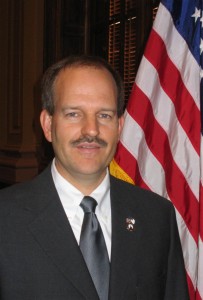By Sen. Chip Pearson

DAWSONVILLE (Jan. 22, 2009) – As the Georgia General Assembly kicks off the 2010 Legislative Session, I’m honored to again represent the people of 51st Senate District at the State Capitol. While our most immediate task is to balance the statewide budget, our overarching goal must be to revitalize Georgia’s job sector. The state cannot hope to move forward until we create more jobs and get Georgians back to work.
The release of the Governor’s budget recommendations garnered the most attention during the session’s first week. He’s proposed a $15.5 billion spending plan in state general funds for the rest of Fiscal Year 2010, which ends June 30. This is a more than $1.4 billion reduction from the original FY10 budget, and puts us back at revenue levels from 2005. Georgia has grown by over half a million people since then, while our budget has shrunk by almost $4 billion. Right now, the FY11 budget stands at $16.8 billion. Just like families across Georgia, we must operate the state on significantly less than in years past. The harsh reality is that we’re going to have to make additional cuts as revenues continue to decline, which means core areas of government will have to shoulder some of the burden.
Out of the $15.5 billion we have to spend for the remaining fiscal year, about $10 billion of that goes to education. Our choices are limited when looking for areas to cut spending, and unfortunately this is a place where we’ll see some reductions. Education funding made headlines during the second week of session as both the Senate and House recessed for joint budget hearings. We heard from State School Superintendent Kathy Cox, who noted that giving school systems more flexibility in class size could help manage the cuts until more funds become available.
In his State of the State address, Gov. Perdue urged the legislature to make the difficult decisions now to prepare the state for a better future. I agree that there is no time to waste in getting the state back on its feet after a devastating economic recession. While making decisions like cutting education funding are difficult, solving these problems now saves our children and grandchildren from bearing the burden of a financially insolvent state.
Looking ahead, the Senate will soon begin committee hearings and moving legislation to the floor for a vote. As chairman of the Senate Economic Development Committee, I’m kicking off our first meeting on Tuesday, Jan. 26 in a joint hearing with the House committee to look at jobs and Georgia’s economic forecast. We’ll hear from several economic experts and discuss ideas on how to bring more jobs to Georgia. I encourage you to join us for the meeting, which will be streamed live from 2:00 to 4:00 p.m. on the Georgia General Assembly website at http://www.georgia.gov/00/channel/0,2141,4802_6107101,00.html. Follow the link, and select House Rules Committee Meeting.
The meeting marks the beginning of our conversation this session on how we create an atmosphere in Georgia to encourage job growth. As one of the lowest taxed states in the nation with the lowest debt per capita, Georgia is poised for a strong economic recovery. Compare that to Massachusetts, which has some of the highest taxes and debt per capita in the nation. Their voters just elected a Republican to the U.S. Senate for the first time since 1979, and are clearly disenchanted with the culture of high taxes and debt burden that’s pervaded their state under Democratic rule. Their vote is a direct rebuke to the ObamaCare and Cap and Trade measures that threaten to run our national economy into the ground.
It’s projected that the passage of Cap and Trade legislation would result in the loss of over 50,000 jobs in Georgia, an increase in household utility costs of $676 per household through 2035, and a state personal income loss of over $5.5 billion. I’ve introduced a resolution this year to request that Georgia’s congressional delegation oppose Cap and Trade legislation to avoid passing an energy tax that hurts all Americans. While proponents of Cap and Trade claim it aims to reduce carbon emissions and decrease the spread of global warming, it’s actually an energy tax aimed at deterring Americans and Georgians from consuming energy that will result in increased utility bills, slowed economic growth, and a decrease in job creation.
I’ll begin introducing this and other legislation next week, and will follow up in detail on each measure as we continue through session.
I was pleased to welcome my pastor and friend, Rev. Tom Stradley of Amicalola Baptist Church, to the State Capitol to serve as our Pastor of the Day during the first week of session. He delivered an inspiring message to the Senate Chamber and reminded us to have courage as we make the difficult choices on behalf of Georgia citizens this session. Rev. Stradley has been the pastor of our church since 2006, where my family and I have worshipped for nearly 10 years.
Sen. Chip Pearson serves as chairman of the Economic Development Committee. He represents the 51st Senate District which includes Dawson, Fannin, Gilmer, Lumpkin, Pickens, and Union counties and portions of Forsyth and White counties. He may be reached at 404.656.9921 or via e-mail at chip.pearson@senate.ga.gov.
COLUMN
For Immediate Release:
January 22, 2010
For Information Contact:
Raegan Weber, Director
Kallarin Richards, Senior Communications Specialist
kallarin.richards@senate.ga.gov
404.656.0028